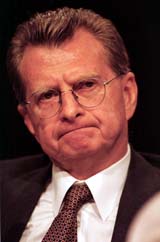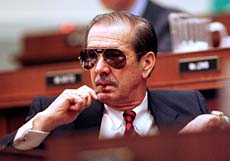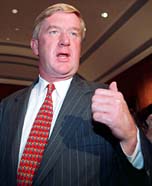
Ted Turner pledged to donate $1 billion to programs endorsed by the United Nations, including medicine, land-mine removal, and aid to refugees. Turner, who claims to be worth $3.2 billion, will spread the gift over 10 years. The Associated Press suggested that this will heighten pressure on other billionaires to follow suit. (For more philanthropic inspiration, consult the latest installment of the Slate 60, our roundup of charitable contributions.) (9/19)


Campaign-finance scandal bonanza: 1) Businessman/accused embezzler Roger Tamraz testified that he gave $300,000 to the Democratic National Committee and its designees in order to buy influence with President Clinton and to promote a lucrative oil pipeline project. Senators accused Tamraz of gaming the system. He replied that the whole system is a game. Pundits welcomed his refreshing candor and comic relief. (For more on the Senate campaign-finance hearings, see Jacob Weisberg's dispatches.) 2) Aides to Teamster president Ron Carey pleaded guilty to funneling illegal donations to Carey's campaign, and said that the DNC tried to steer $100,000 from a foreign citizen to Carey's campaign in exchange for Teamster contributions to the DNC. 3) The Washington Post disclosed memos in which Dick Morris detailed his use of DNC "soft" money for the Clinton-Gore campaign. 4) Church/state watchdogs released a surreptitious tape recording of Pat Robertson discussing partisan political strategy at a private Christian Coalition meeting. (Best quote: "If there's any press here, would you please shoot yourself?") The tape is being forwarded to the IRS and the Federal Election Commission, which are investigating whether the coalition used tax-exempt contributions for partisan politics. (9/19)

New York City's Board of Elections canceled the Democratic mayoral runoff and declared Ruth Messinger the nominee. Eight days after the fact, the Board said the final ballot count, including absentees, pushed Messinger's tally above the crucial 40 percent. The loser, the Rev. Al Sharpton, sued to throw out this decision, citing fraud and incompetence. Pundits derided the board's clumsiness and skewered Sharpton for demanding a runoff, which he had previously denounced as a racist institution. The old consensus on Messinger's chances against incumbent Rudy Giuliani: She's toast. The new consensus: She's still toast. (For more on Messinger see James Traub's "Assessment" of her.) (9/19)

Ex-Rep. Bob Dornan was banned from the House floor, pending the resolution of his claim that he lost his seat by voter fraud. The vote was 289-65. Dornan was booted for 1) allegedly using his floor access to lobby ex-colleagues about his fraud case and 2) getting into a nasty altercation with a current congressman. (9/19)

President Clinton set aside the $368-billion tobacco settlement and proposed instead to: 1) stiffen financial penalties, raising the price of a pack of cigarettes by as much as $1.50; 2) give the Food and Drug Administration complete authority to regulate nicotine; 3) make cigarette companies cough up documents disclosing past sins; 4) extend the anti-tobacco campaign beyond teens to adults, secondhand smoke, and exports; and 5) compensate tobacco farmers for their loss of income. The political assessment is that Clinton can squeeze tobacco companies as hard as he wants because 1) they can't afford to go back to fighting hordes of lawsuits from states and individuals and 2) tobacco will be a popular target for Democrats in the 1998 elections. (9/17)

Attorney General Janet Reno replaced the leadership of the Justice Department's campaign-finance investigation team and expanded its staff. Analysts regard this as a response to investigators' goofs, in particular their failure to discover (until the Washington Post did) that contributions solicited by Vice President Gore went to "hard" money accounts and may therefore merit an independent counsel. The superficial spin is that the shake-up pre-empts Republican demands for an independent counsel. The deeper backspin is that it makes an independent counsel more likely by 1) confirming the incompetence of the in-house probe and 2) getting rid of the chief investigator, who had resisted scrutinizing senior Clinton officials. Other news on the scandal: 1) The first witnesses called by the House investigating committee backed out over an immunity dispute, prompting more derision of the committee. 2) Every Democratic senator has signed on to the McCain-Feingold campaign-reform bill, but it's doubtful that they'll get enough Republicans to defeat a filibuster. (9/17)

President Clinton submitted his fast-track trade proposal to Congress. It would limit Congress to voting up or down, without amendments, on trade deals negotiated by the president. Most Hill Democrats oppose the measure on the grounds that it will prevent them from subjecting trade partners to the same "enforceable labor and environmental standards" imposed on American companies. The AFL-CIO is running $1 million worth of ads against Clinton's request. Having lost the pleasure of the GOP's blood bath between Weld and Helms, pundits are looking forward to the Democrats' blood bath over trade, particularly a showdown between Vice President Al Gore and House Minority Leader Dick Gephardt. (9/17)


Journalism roundup: 1) Outraged by the purported role of paparazzi in Princess Diana's death, celebrity-turned-Rep. Sonny Bono is pushing a bill to protect celebrities from the press, on pain of long jail sentences. The press is outraged. 2) California state Sen. Tom Hayden is proposing to ban telephoto lenses. 3) National Enquirer editor Steve Coz, who has used the Diana controversy to distinguish the Enquirer from less scrupulous tabloids, reportedly has been consulted about taking over the New York Daily News. 4) The New York Times added color photos and new sections. These changes were widely reported in the New York Times. 5) Citing the Princess Diana tragedy, Hillary Clinton implored the media to honor Chelsea's privacy as she goes off to college. The networks responded with extensive footage of Chelsea (running like an "ungainly adolescent" and sniffling after a hug with her dad--videotaped from a distance through trees) and details about her roommate and dorm arrangements. (9/19)


Bill Weld quit his battle for confirmation as U.S. ambassador to Mexico. Senate Foreign Relations Committee Chairman Jesse Helms had announced at a Sept. 12 committee meeting that he would not give Weld a hearing. Before bowing out, Weld went on national television to lambaste Helms as a moral right-winger, Washington insider, and un-American tyrant. Editorialists sniffed that while Helms may have won the battle in the Senate, he lost the larger war for the hearts and minds of editorialists. The New York Times compared Helms to "a Communist potentate." (See Slate's "Frame Game" on Weld vs. Helms.) (9/17)


The IRS is auditing Paula Jones. Her spokeswoman, Susan Carpenter-McMillan, accused the service of harassing Jones and added that President Clinton was capable of "Nixonite" abuse of the IRS to persecute his enemies. As an example, Carpenter-McMillan cited a White House attorney's 1993 threat to sic the IRS on troublesome travel-office employees. "Would I ever go on national TV and accuse President Clinton of using the IRS to harass his detractors? I would never be so blunt," Carpenter-McMillan said on national TV. Clinton spokesman Mike McCurry denied having colluded with the IRS, saying it would be "insane."(9/17)


Militant Jewish settlers took over two houses in disputed East Jerusalem in an apparent challenge to U.S. Secretary of State Madeleine Albright's call for a "timeout" on further Jewish settlements. The seizure overshadowed goodwill gestures announced by Israel, including the release of some revenue withheld from the Palestinian Authority, and partial opening of the West Bank and Gaza. For its part, the authority reportedly began preparing a plan to destroy terrorist groups and to let the United States monitor Palestinian arrests of suspected terrorists. Pundits, having accepted Albright's sober assessment of her Middle East trip, had almost no time to applaud the apparent resuscitation of the peace process before the settler setback. (9/15)

Cable networks eclipsed broadcast networks at the Emmy awards. HBO won more prime-time award nominations than any other network (90), and its Larry Sanders Show set a new record for nominations in the half-hour category (16). Broadcast-network executives complained that cable shows should be judged separately because they're better funded and advertised. Cable executives embraced these complaints as the sincerest form of flattery. Reviewers marveled at the awards ceremony's perennial ability to make interesting programs seem boring. (9/15)
Photographs of: Roger Tamraz by Win McNamee/Reuters; Sonny Bono by Win McNamee/Reuters; Bill Weld by Mark Wilson/Reuters; Paula Jones and Susan Carpenter-McMillan by Sam Mircovich/Reuters; Palestinian protester by Nati Shohat/Reuters.
